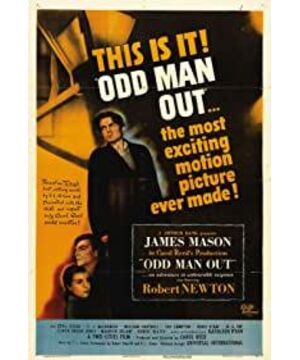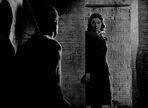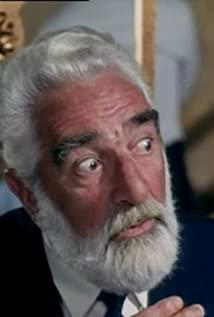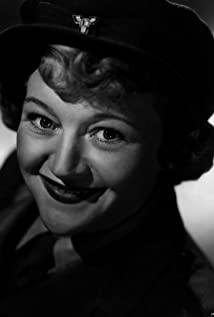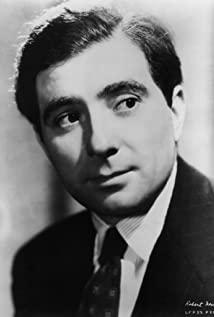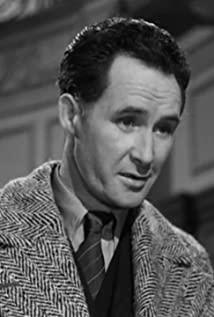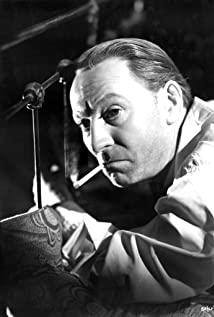1. Carol Reed's "Black Trilogy"
Carol Reed started performing on stage at the age of 16, and after about 20 years in the "entertainment industry", she became a film director. Before World War II, Carol Reed had directed several works, but none of them received much attention. In 1940, "Night Train to Munich" was his first work that received attention. The film is a thriller set in the background of World War II, and the style is closer to Hitchcock's similar films.
At the end of World War II, Carol Reed had been a director for about 10 years, and he had directed more than ten works, but he had been groping forward, and he had not yet made a history of photos with obvious personal marks and names. s work. But between 1947 and 1949, Carol Reed ushered in the peak of his creation, shooting three "noir films" in succession: "Tiger Soul" (1947), "Fallen Idol" (1948), The Third Man (1949). These three films are the "Black Trilogy" that made Carol Reed famous in the history of photography.
"Black Trilogy" and "Night Train to Munich" were released by the famous American video disc distributor "Criterion Films" (CC), and they have penetrated into the hearts of a new generation of movie fans.
2. This is not a political film
"Tough and Faithful" tells the story of a leader of a secret organization in Northern Ireland who was injured and fled. Such a theme can easily make the audience "seat in the right place" and interpret the film in a political direction. But Carol Reed has emphasized that he wants to photograph common human encounters and emotions, not politics. For this "goal", Carol Reed weakened many "political elements" in the film, such as a certain degree of blurring of Belfast, where the story takes place, and for example, there is no clear secret organization that is the Irish Republic Army, wait. Moreover, the revolt of the secret organization in the film is limited to a robbery and does not involve any military action or large-scale violent confrontation, which has minimized the political overtones of the film.
In fact, the reason why the "Black Trilogy" is a "trilogy", in addition to the coherence of the creation time and the consistency of the image style, is that the themes of the films are relatively close-the three films all show the grayness of human nature. noodle. Different from "Fallen Idol" and "The Third Man", which show the "degeneration" and "sin" of man respectively, "Tiger Soul" is more prominent in the performance of the atmosphere, and the tragedy of man is deeply immersed in the atmosphere.
The Irish Republican Army is a very complex military organization, many countries regard it as a terrorist organization, and the people who support its nationalist struggle regard its members as "heroes". It would be inappropriate to say that "Tiger Brave and Loyal Soul" has no political references. Under the high reward offered by the British government, ordinary people did not dare to inform, and some people were willing to "provide" help to fugitives, which fully demonstrated the pervasive influence of this secret organization in the local area and its violent characteristics. The British government's chasing police rarely appear head-on in the film, but they are always strong and decisive, and they are ruthless in their pursuit of members of secret organizations who have committed serious crimes. The resisters are a huge shadow to the whole society, and the oppressors have become an even bigger shadow over the resisters and their supporters. In this struggle, there is actually no real winner, only one social tragedy.
It can be said that Carroll Reed viewed this struggle or this tragedy primarily from a humanitarian standpoint. Carroll Reed's stance is more neutral than the "left" stance of similarly themed "Bloody Sunday" (2002) and "Breaking the Wheat" (2006).
3. Lonely Escape
British star James Mason starred in the film as Johnny, the head of an indecisive secret society and a troubled fugitive. His pained and melancholy face played out Johnny's personality and tragic fate.
After Johnny escaped from prison, he hid in his girlfriend's house for more than half a year. Perhaps the long-term claustrophobia and depression had worn away his will to fight. Before the robbery, he expressed his desire for "peaceful resistance". His companions and friends thought he was no longer fit for the operation and wanted to replace him, but he insisted on going out in person. Unsurprisingly, when he ran away after the robbery, he felt dizzy and was overtaken by the bank's security personnel. During the scuffle between the two, he was shot and injured by the other party, and he shot the other party in a frenzy. Because of the selfishness and panic of his teammates, Johnny failed to get in the car and escaped and was left alone, thus starting his lonely escape.
On the run, Johnny repeatedly asked if the man he shot was dead. It can be seen that he is by no means a heinous thug, and obviously, it is difficult for him to become an indomitable "fighter". In the secret organization, Johnny is lonely, and his loneliness is amplified during the escape.
He has met men and women who cheated on him, met his companions and friends who covered him, met two well-meaning women, met a man who was afraid of getting into trouble, met a coachman who sympathized with him, met a wrong-hearted man An old friend, he met a bar owner who wanted to stay out of trouble, met a "doctor" who was eager to help him, met a crazy artist,... In all encounters, he could not get rid of loneliness, he was a loneliness fighter , but also the lone fugitive.
Finally, he met his girlfriend Katherine who loved him, and found a reliable support - but, only death can free him from loneliness.
4. In winter
The story takes place in winter, cold, humid, and freezing.
When the film started, it was cloudy, but it was already cold. About halfway through the film, after Johnny warmed himself up with wine and left the house that rescued him, it started to rain, and hit the carriage by accident, allowing him to avoid the police search and let him escape. Washed by the cold rain. While waiting in the dark corner, the snow came. In the snowflakes, Johnny broke into the lively and warm bar. When he was dying, he was pulled into the residence of the crazy artist, where the four walls were ventilated. He received basic medical treatment and a moment of peace, and at the same time he had to accept the artist's "exploitation". In the end, he continued to run away, wandering in the wind and snow... The gunshots sounded, and he and his girlfriend fell on the pier in the wind and snow.
Fleeing in the winter, in the rain and snow, aggravated the pain of Johnny, who was seriously injured, and deepened his sense of loneliness. Every step he took, he was closer to despair. When he saw Catherine, he had lost the surprise of the rest of his life, he cowered close to her, continued to flee, and then fell together in despair.
5. Sad City
Since the establishment of the Irish Republican Army in 1919, for nearly a century, Northern Ireland has always been shrouded in the shadow of the struggle between the Irish Republican Army and the British Army, so that many people in Northern Ireland are concerned about political conflicts and gunfire. It seems to have gotten used to it. Although the IRA was disarmed in 2005, two more terrorist attacks in Northern Ireland in March 2009 cast a shadow over the peace process in Northern Ireland.
Belfast, as the capital of Northern Ireland, is also the heart of the struggle between the two sides, and it is destined to become a tragic city in the long-term struggle.
And in "Tiger Brave", Belfast is shaped into a sad city. Neither the IRA nor Belfast are explicitly referred to in the film, but judging from the scenes in the film, the story undoubtedly takes place in Belfast - streets, clock towers, bars, The docks, etc., all point to Belfast. But in fact, very few scenes were filmed in Belfast, only some insignificant street scenes were filmed on site, and other scenes were built in huge studios - such as the clock tower and the bar , are all set. The interior and exterior of the bar are highly similar to the famous local Crown Bar, so that many fans regard the real Crown Bar as a pilgrimage site for the film - in fact, the film was not filmed in the Crown Bar.
It also shows the scene of the city. Most of the scenes in "The Third Man" were shot on site in Vienna, but "Dare and Loyalty" is mainly studio shooting. Carol Reed probably wanted to shoot on location too, but the subject matter of the film is more sensitive (at least in Northern Ireland), and it's hard to keep the crew safe when shooting in Belfast. However, the "Belfast" that Carol Reed created in the studio is almost real, and the performance of this tragic city has not been compromised. Moreover, because it was shot in a studio, the "weather" is controllable, and the "artificial" cold rain and snow weather further highlights the overall atmosphere of the sad city.
The light and shadow structure of The Third Man has become a textbook classic. In fact, in "Third Man", the dark night scenes, wet streets, shadow movement, and slanted composition have all had excellent performances. "On the basis of carry forward.
If Vienna is the "City of Sin", then Belfast is the "City of Sorrows". Whether it is the government army, the rebel army, or the ordinary people, they all live under the shadow of fear - this is a city where violence and tragedy may happen at any time, this is a city where everyone is in danger.
Of course, the greater "sadness" is that the people living here have gradually adapted to the ubiquity of conflict and violence - they have gone from helplessness to numbness.
6. William Owen
The soundtrack in "Tiger Brave" is very restrained, and the real "sadness" does not need to be rendered.
William Owen is a well-known British film score composer. In addition to "Tough Soul", he also collaborated with Carol Reed on "Fallen Idol". The soundtrack of "Tiger Brave" is considered to be the pinnacle of his soundtrack career.
As a black thriller, "Tiger Soul" actually needs music to support it very much, but William Owen did not overuse his "privilege", and he never took advantage of the part that should be left to the sound engineer to perform. Video, performance, music, and sound effects perform their respective roles in the film and support each other, so that the best presentation of the film can be achieved.
William Owen composed the theme music for Johnny, Katherine and Shell (Johnny's old acquaintance) respectively, to express the personalities and encounters of the three, but he used it very carefully Sensational.
A good soundtrack is generally not too full, and William Owen was an early composer who realized this. William Owen's score adds a bit of chill to the "sad city" of Belfast in the film, and that's enough.
View more about Odd Man Out reviews


